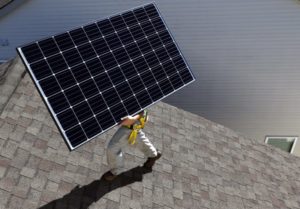Why Solar is not a DIY (Do It Yourself) project

At Ecohouse Solar we regularly get calls from people who want our advice about where to buy solar equipment so they can install it themselves. We respond by letting them know that trying to install a solar electric system by yourself is a bad idea.
Here are the reasons why:
SAFETY
Working on roofs is dangerous, especially if the roof is steep. It is important to be able to use ropes and harnesses for fall protection. Using this type of equipment takes some training and practice. Secondly solar is potentially dangerous because you are dealing with high voltage electricity, especially when you are installing the solar inverter and tying the solar into the existing electric service. Safety is important.
INSURANCE
A professional solar installer like Ecohouse Solar carries Workers Compensation insurance, just in case someone does get injured. We also carry liability insurance that provides coverage to the building owner in case something goes wrong.
ROOF DAMAGE
Installing solar usually involves working on a roof and attaching the solar hardware to the roof structure. Solar companies provide workmanship warranties that cover the buyer in case of roof damages or leaks in the roof. Ecohouse Solar provides a 10 year workmanship warranty.
ELECTRICAL WORK
It is very important to know the details of how to do this type of work, in terms of designing the system correctly, choosing the appropriate materials, and performing the work according the electrical code. Usually the installation needs to be permitted and inspected by an electrical inspector. There is a good reason why training to be an electrician takes 5 years. The work is complex and dangerous, and not a good choice for the week-end warrior.
There are many details that a professional solar installation company like Ecohouse Solar has learned by doing hundreds of installations.
A Solar Electric system is an expensive investment. You want to be installed correctly so that you get the full value of the investment, and so it will last for 30 or more years.
PERMITS and INTERCONNECTION AGREEMENTS
Most cities and counties require that solar installations to get building and electrical permits. This involves doing structural and electric engineering prior to construction, and understanding the details of what is specifically needed by the jurisdiction to get these permits. It also involves scheduling an inspection and being able to explain your work to the inspector.
In addition, the electric utility requires an Interconnection Agreement application for net metering. This also involves understanding and submitting the correct paperwork, and details the are unique to each electric utility, such as what you need to do after the installation is complete, in order to get a new bi-directional meter installed.
TAX CREDIT
Currently 30% of the cost of the solar electric system will be re-imbursed to the Buyer with a Federal Tax Credit. A Solar Professional will provide a final invoice that can be used as evidence of the total expenditure in case the Buyer is audited by the IRS.
ZONING and HOA (HOME OWNERS ASSOCIATION)
In many communities around Columbus, Ecohouse Solar has to submit information to the local zoning department to get the solar project approved. They expect professional drawings and design. Sometimes an HOA will require similar documentation. It is not something the average homeowner can easily do.
It is for these reasons and more that it makes sense to hire an experienced, professional solar installer such as Ecohouse Solar, to design and install your solar electric system. You want to know it is installed safely and correctly.
Ecohouse can get your solar system installed quickly and efficiently so that you can quickly begin to reduce your carbon emissions and turn sunshine into electricity.







